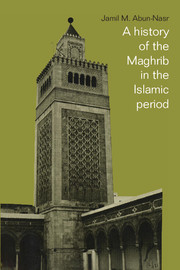Book contents
- Frontmatter
- Contents
- List of maps
- Preface
- Glossary
- 1 Introduction
- 2 The call of the minaret in the ‘West’: the establishment of Islam in the Maghrib and Spain
- 3 The Maghrib under Berber dynasties
- 4 Ottoman rule in the Central and Eastern Maghrib
- 5 Morocco consolidates her national identity, 1510–1822
- 6 The age of aggressive European colonialism, 1830–1914
- 7 1919 to independence
- 8 Epilogue: the Maghrib after independence
- Bibliography
- Index
8 - Epilogue: the Maghrib after independence
Published online by Cambridge University Press: 05 June 2012
- Frontmatter
- Contents
- List of maps
- Preface
- Glossary
- 1 Introduction
- 2 The call of the minaret in the ‘West’: the establishment of Islam in the Maghrib and Spain
- 3 The Maghrib under Berber dynasties
- 4 Ottoman rule in the Central and Eastern Maghrib
- 5 Morocco consolidates her national identity, 1510–1822
- 6 The age of aggressive European colonialism, 1830–1914
- 7 1919 to independence
- 8 Epilogue: the Maghrib after independence
- Bibliography
- Index
Summary
One of the problems which aroused heated political controversies in the four countries of the Maghrib in the years immediately after they attained independence was their continued dependence in many respects, especially economically, on the western world, including the former colonial powers. The Moroccan socialist leader al-Mahdi b. Baraka (1966, pp. 45–77) has attributed the speed with which the French reached an agreement with Muhammad V, after he was brought back from exile in Gabon in 1955, over granting independence to Morocco, to their desire to forestall the emergence of more radical leaders in the country, who would be less prepared than the sultan to preserve his country's ties with France. A similar charge was made by Salih b. Yusuf and Ahmad b. Salih regarding the agreement which Bourguiba concluded with the French in 1955 under which Tunisia obtained automony at first (see above, pp. 366–7). Likewise the British, by ensuring that independent Libya would be a federal state ruled by King Idris, sought to preserve their own interests and those of their western allies, especially the U.S.A., in that country. Nevertheless, it would be wrong to attribute the readiness of the leaders of the independent states of the Maghrib to maintain close ties with the countries of the western world alone to the manipulations of the former colonial powers, real and effective as these sometimes were.
- Type
- Chapter
- Information
- A History of the Maghrib in the Islamic Period , pp. 408 - 428Publisher: Cambridge University PressPrint publication year: 1987



